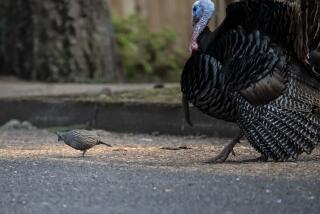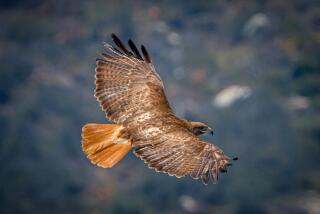A Plucky Duck
- Share via
When the children found her, the young mallard duckling was lying on a grassy slope leading down to the brook. Our family’s venerable calico cat stalked past, his tail switching in the hunting posture that he assumes that time of year, spring, a season when wild ducks, nesting in the sycamore overhanging our suburban backyard creek, carry offspring from trees to ground in their bills. Occasionally, an impatient duckling, overeager for adventure, tumbles out of the nest by itself.
Our daughters nursed this particular foundling back to health, and she grew plump, her feathers glistened, and she rewarded her benefactors with impertinent squawks that kept us laughing--even through the indignities to our new, wall-to-wall carpeting.
Secretly, I lived with the certainty that when the wild ducks migrated again, Heidi, as she was named, would join up with them, to mate for life in the steadfast wild mallard tradition. It would only be a while longer, I told myself, ticking off the months on my fingers, and glancing at the carpet. Meanwhile, Heidi was teaching the children lessons in responsibility.
Heidi took over the house, garden and its denizens. Freda, our German shepherd, is a retired attack dog (“A killer dog!” our neighbors shudder; “Wouldn’t have her around”), but Heidi soon began to fold herself between Freda’s paws and occasionally to even tweak the dog’s nose with her beak. Avoiding corn, oats, beans and all other proper duck fare, Heidi ate from the cat’s bowl. And the cat permitted it. At night, all three animals arranged themselves together in one corner of the front hall.
The first Thanksgiving after Heidi came to live with us, I prepared the turkey. But when I carried it to the oven, Heidi scolded me so shrilly that I almost dropped the bird. She waddled up and down the kitchen on her yellow webbed feet, ruffling her wings, protesting. She cocked her dusky head and stared at me accusingly. Finally, I set the roasting pan down on the butcher-block table and burst into tears. Thanksgiving, for us, became a vegetarian meal.
Then fall came. Heidi was grown, and I was sure that when the flocks flew overhead again, she would join them. I bought a bird whistle engineered to attract mallards. But though I signaled wildly when the long Vs floated above us, no one dropped down to look us over, and Heidi nonchalantly emptied the cat’s dinner bowl.
One day the following spring I was upstairs, throwing open windows, the sunshine pouring in. I closed my eyes for a moment, then leaned far out the window and looked down the grassy slope to where Freda was rolling over, and over, chewing on a blade of grass. The cat was nibbling catnip in the herb patch. Behind the two toddled Heidi, trying to keep up.
From the foothills opposite sailed two hawks, gliding along like a pair of children’s kites, carried along on a down draft.
Suddenly there was a horrible squawk; one hawk had swooped down, and then the other. Heidi was struggling in the wet grass, bleeding. A hawk had extracted one of her eyes.
We nursed Heidi, the children most diligently of all. Soon she was wobbling about, trying to maintain her balance as her injuries healed. In time, she adjusted and recovered her former brassy personality.
Autumn after autumn, the ducks flew over us. But Heidi never once turned her good eye toward them. And I, having adjusted as well, no longer glanced with regret at the living-room carpet.






